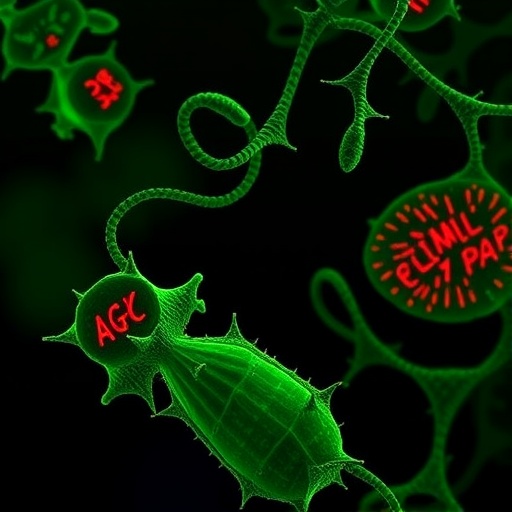In recent advancements in cancer research, a ground-breaking study has emerged, shedding light on a promising compound that may significantly impact the treatment of hepatocellular carcinoma (HCC). Researchers led by Yang, Ning, and Chen have undertaken a computational exploration of potential inhibitors targeting heat shock protein 90 alpha family class B member 1 (HSP90AB1), a protein crucial in tumor progression and survival. Their focus culminated in the identification of 4′-O-methylochnaflavone, a compound that could represent a novel therapeutic avenue for managing HCC.
Hepatocellular carcinoma remains one of the most prevalent forms of liver cancer worldwide, often arising in the context of chronic liver diseases such as hepatitis and cirrhosis. Traditional treatments, including surgical resection and liver transplantation, face limitations due to late diagnosis and the aggressive nature of the disease. Thus, there’s a pressing need for innovative therapies that can enhance treatment options and improve patient outcomes. This study offers hope in that direction.
The methodology employed in this investigation merges computational biology with experimental validation, underpinning a contemporary approach to drug discovery. Utilizing high-throughput screening techniques, the authors meticulously sifted through libraries of small molecules to pinpoint potential HSP90AB1 inhibitors. Their use of advanced molecular docking simulations allowed them to evaluate the binding affinities of these compounds to the target protein, providing a predictive insight into their efficacy.
The computational analysis revealed that 4′-O-methylochnaflavone exhibited a significant binding affinity for HSP90AB1, suggesting it could effectively disrupt the protein’s function. Given HSP90AB1’s role in maintaining oncogenic protein homeostasis, inhibiting its activity could lead to the degradation of numerous client proteins involved in tumor growth. Hence, the rationale for developing this compound as a therapeutic agent becomes apparent, promising a mechanism of action that could enhance the effectiveness of existing treatment modalities.
Subsequent to the computational predictions, the team proceeded with experimental validation to affirm their findings. This phase involved synthesizing the compound and conducting a series of in vitro assays to assess its anti-cancer properties. Remarkably, the results demonstrated that treatment with 4′-O-methylochnaflavone led to significant apoptotic effects in HCC cell lines. Such findings not only underpin the compound’s potential as a therapeutic agent but also underscore the importance of integrating computational and experimental strategies in modern drug discovery processes.
Furthermore
Tags: 4′-O-methylochnaflavone for hepatocellular carcinomacomputational biology in drug discoverydrug discovery methodologies in cancerexperimental validation in cancer studieshigh-throughput screening in cancer researchHSP90AB1 inhibitors in cancer treatmentinnovative treatments for liver diseasesliver cancer therapeutic advancementsmechanisms of hepatocellular carcinoma progressionnovel therapies for liver cancertargeting heat shock proteins in oncologyYang Ning Chen research contributions





